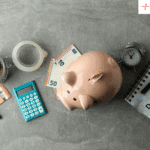Protecting your personal information can help reduce your risk of identity theft. There are four main ways to do it: know who you share information with; store and dispose of your personal information securely, especially your Social Security number;
ask questions before deciding to share your personal information; and maintain appropriate security on your computers and other electronic devices. (FTC)
In a recent article we talked about clearing out your financial clutter (Financial Clutter, What to Keep and What to Get Rid of) and where to keep it. When storing your personal and financial information it is important to keep it secure, “offline” and online. The following are a few tips for keeping your offline information as secure as possible.
— Lock up your financial documents and records in a safe place at home. Remember the firebox we suggested if you are keeping your important documents at home? Well, it’s a good idea to not only keep you documents in the firebox but to also keep it locked. …not with the key hanging from the lock like my firebox, but actually locked and the key placed somewhere safe.
— Depending on where you work, it’s also a good idea to lock your wallet or purse in a safe place at work.
— Keep your information secure from roommates or guests who come into your home.
— Try to limit what you carry. There is no need to have a huge, bulging wallet or over-stuffed purse. When you go out, take only the identification, credit, and debit cards you need. Leave your Social Security card at home. Another good idea is to leave your Medicaid card at home (unless you are going to the doctor’s office) and carry a copy with all but the last four digits of the number blacked-out.
— Before you give out your information to a business, your child’s school, a doctor’s office or any other business, ask why they need it, how they will make sure it is safe, and what will happen if you decide not to share your information.
— Although it seems that nowadays any receipts you receive from purchases you have made already block out or omit your account number, it is still a good idea to shred receipts, credit offers, credit applications, insurance forms, physician statements, checks, bank statements, expired charge cards, and similar documents when you don’t need them any longer.
— Here’s one that most people, myself included, neglect to do, and that is to destroy the labels on prescription bottles before you throw them out
— Unless you have a locking mail box, including the outgoing mail, you should, when mailing your bills or anything that contains your personal information, take it to a post office collection box or the post office. Also, it you have a regular mailbox, either at the curb or attached to your house. Be sure to promptly remove any mail that arrives. …If you won’t be home for several days, request a vacation hold on your mail.
— When you order new checks from your bank, don’t have them mailed to your home, unless you have a secure mailbox with a lock.
— Opt out of pre-screened offers of credit and insurance by mail. You can opt out for 5 years or permanently. To opt out, call 1-888-567-8688 or go to optoutprescreen.com.





